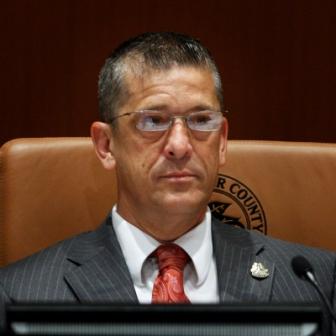
INDIAN RIVER COUNTY – Five hours into the most heavily-attended county commission meeting in years, commissioners voted 4-1 to withdraw from Seven50, a regional planning group some opponents said would spearhead a diabolical assault on property rights and freedom driven by advocates of one-world government.
Several hundred people, many waving miniature American flags, filled almost every seat in the commission chamber and spilled over into the aisles as County Director of Development Bob Keating introduced the issue.
He said Seven50 is putting together long-range plans to deal with transportation, data management, sea level rise and socioeconomic trends over the next 50 years.
The 34-member commission, comprised of elected officials, businesspeople, academics, engineers and other professionals, is funded by a $4.2 million federal grant and is about halfway through its three-year tenure. It aims to integrate interagency planning in seven counties and approximately 120 cities and other entities between Sebastian and Key West.
Keating said HUD, the EPA and the U.S. Department of Transportation believe large-project planning is more efficient on a regional level, avoiding duplicate or conflicting schemes by individual counties or cities, and that the agencies have indicated they will distribute grant money in accordance with regional plans. He suggested Indian River County might miss out on substantial funding for infrastructure and other needs if it withdraws from the planning group.
“Over the past couple of years we have gotten quite a bit of discretionary funds [from the federal government], and it is questionable if we would have gotten the money if we were not part of the regional planning,” Keating said.
He mentioned a $1.56-million grant the county received to build a transit hub that might not have been awarded if it was not part of a regional group.
Keating also said Indian River County is at the margins of the seven-county group and that many of its plans may not be applicable here.
Opponents of participation in the group, who appeared to make up 99 percent of the audience, said the federal money was a dangerous lure intended to ensnare the county and subject it to greater federal or perhaps even international control.
One speaker said regionalism is an un-American concept that would “take away our liberty and way of life.”
Another said Seven50 would “destroy the freedom of citizens and try to make us dependent on government.”
Opponents described a future in which Vero Beach would be forced to erect “stack and pack high-rises” in the name of sustainability and said “millions of AMTRAC visitors would swarm our beaches.”
Somewhere between 20 and 30 people went to the podium, many with lengthy prepared remarks.
Glenn Heran, President of the Taxpayers’ Association of Indian River County, Toby Hill, head of the Indian River Tea Party, and recent county commission candidate Bea Gardner urged commissioners to withdraw from the group while there is still time.
Gardner ended her remarks with a diatribe against the United Nations, saying it was time “to get the U.N. out of the U.S. and the U.S. out of the U.N.”
A number of speakers included denials of climate change and sea level rise in their remarks to discount the need for some proposed planning, but the dangers of being subjugated or even enslaved by “a faceless bureaucracy” was the predominant theme.
They also stressed the misfit between Indian River County and more densely populated counties to the south and expressed a strong desire for local planning overseen by elected officials.
After several hours, Kevin J. Foley, Chairman of the Treasure Coast Regional Planning Council spoke in favor of the county’s continued participation inSeven50.
He said the group is not faceless.
“It is my face.”
He mentioned a number of other known people with visible physiognomies who serve with him and said he had only seen one federal official one time during the year and a half the group had been meeting.
He pointed out that it is a non-governmental organization with no power to compel any county or city to follow the recommendations it will come up with at the end of its three-year timespan.
Trying to establish bonfides with an obviously skeptical audience he said had been a longtime aide to Presidents Ronald Reagan and George H.W. Bush and was a strong believer in their philosophy of small government, but that Seven50 is a valuable undertaking that will improve the future of the region.
“If it was anything like what is being described here today, I wouldn’t have any part of it,” Foley said.
Peter O’Bryan was the only commissioner to argue in favor of continuing the county’s participation.
He said it made more sense to stay involved in the process to advocate for Indian River County’s agenda and see what the plan looks like at the end of the commission and then decide what parts to adopt or reject.
“There might be some parts that would be good for us.” he said. “It is better if we are there fighting for what we want and protecting our interests.”
He stressed that the county could withdraw at any time and read from the bylaws of the organization to reinforce the point that Seven50 has no power to compel any member government to go along with any aspect of its plan, and that there is no danger of subjugation.
A year or so ago, Commissioners Wesley Davis, Joe Flescher, Gary Wheeler and O’Bryan voted to be part of Seven50. Commissioner Solari opposed the idea.
This time, Davis and Flescher joined Solari and recently elected commissioner Tim Zorc to vote in favor of severing ties with the organization. O’Bryan voted against the motion to withdraw.
Whatever the actual or imagined dangers inherent in Seven50, they will still lurk in the county despite the commission’s actions; the cities of Vero Beach, Sebastian and Fellsmere, and the Indian River County School District, are members of the group and will be participating in the planning and implementation of its initiatives, diabolical or otherwise.



